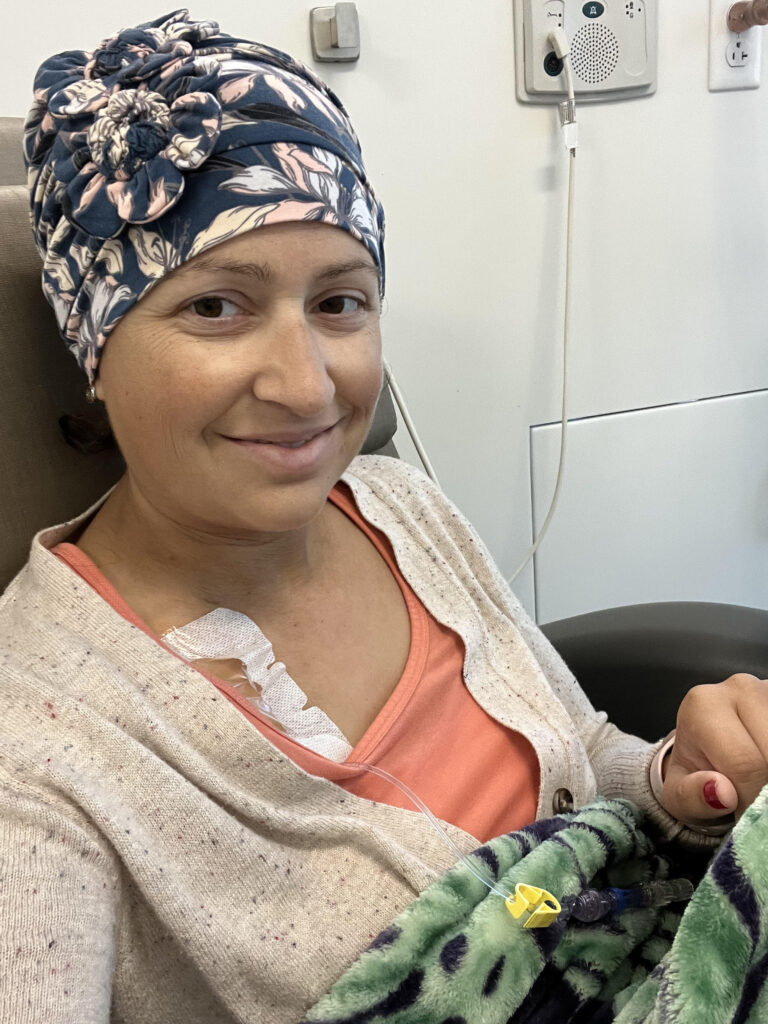How Lauren Niehaus Balanced Everything Throughout Her Breast Cancer Journey
At 35, Lauren was living a vibrant life. Working out 4-5 days a week. Keeping vegan. Raising an incredible child while carrying a financial firm into the future as a Director of Marketing.
So when she felt a lump in her breast in September 2021, cancer was the last thing on her mind.
“I felt great! I was physically in shape & even my doctor initially said it was ‘likely nothing.’”
-Lauren Niehaus, Thriver
It wasn’t. Six months and 8 days after her initial diagnostic mammogram and ultrasound — classified as low-risk — she was called back. This time, things moved faster.
Two breast biopsies and 1 lymph node biopsy confirmed it: invasive ductal carcinoma, triple positive, stage 2b/3a.
“I somehow already knew the results, but still when the call came in & I heard the 3 words ‘you have cancer’ … there was nothing after that,” Lauren says. “After hanging up, I had about a million questions. I had no idea what type, what stage or really what to do next.”
There’s Nothing More Fierce Than A Mother’s Grit
Lauren’s treatment plan was intensive: six rounds of chemotherapy, a year-long immunotherapy regimen, a double mastectomy with 21 lymph nodes removed, 25 rounds of radiation, a DIEP flap reconstruction, and eventually, a full hysterectomy two years later. She also underwent a LYMPHA procedure — a preventive surgery to reduce the risk of lymphedema.

If you’ve experienced cancer before, you can grasp the magnitude of her journey.
Through it all, Lauren remained proactive in her care. At one stage, she had a delayed allergic reaction to Perjeta, a drug commonly used for HER2+ breast cancer. Her oncologist sought to eliminate from the plan.
But Lauren comes from the digital marketing world, so you know she was going to do her own research first and double-check before casting any potential solutions aside!
“I read some stats about the chances of achieving pCR with & without Perjeta. I begged him to let me try once more. He held it during my third treatment, but let me try again during my fourth. Within seconds of the drip starting, I reacted, so he removed it for all future infusions.”
-Lauren Niehaus, Thriver
Parenting, Healing & An Incredible Support Network
Despite the grueling treatments, Lauren continued working full-time remotely. Her support system consisted of her husband, extended family and career flexibility.
“All our family lives 500+ miles away, but they all stepped up in a huge way. We had a third adult in the house all summer — my parents, in-laws and sister took turns flying in. My job was incredibly supportive with my schedule, since I had tons of appointments throughout my active treatment.”
Talking to her 6-year-old daughter about the illness was its own challenge.
“At the beginning, we never used the word ‘cancer.’ We just told her I was sick,” she says. “I was going to have a small surgery and the medicine that wouldn’t make me feel well and caused hair loss would eventually make me feel better.”
Lauren didn’t care if other people knew about her diagnosis. She was more nervous about what other children might say to her in response.
“Another child could say, ‘Oh, my grandpa died of cancer.’ Or an adult would get visibly worried after hearing about it. I didn’t want her to have any idea, at the time, how serious this diagnosis was,” she says.
Redefining Thriving & Navigating Post-Treatment Life
For Lauren, thriving isn’t just about surviving. It’s a mindset to live every day.
“The biggest misconception is that once you complete chemo and surgery, you’re done and your life goes back to normal,” she says. “This is the furthest thing from the truth! You still have tons of maintenance and appointments. I finished active treatment at 36 and was catapulted into menopause with 10 years of hormone therapy.”
Every Blessing Counted, Every Victory Celebrated
Dealing with the financial aspect of a breast cancer diagnosis is one of the hardest hurdles for younger patients to overcome. Many of these women aren’t yet settled in their careers. Their insurance claims may get denied. They don’t have the security safety net to help them get through.
Thankfully, this was not the case for Lauren. All of her treatments and surgeries were approved. She is incredibly grateful for her unique circumstances and now uses her skills to help others who may be struggling after their own diagnosis.
Lifting Others With Thriving Beyond Breast Cancer
Lauren found a sense of community and shared strength online, where she connected with other young women navigating breast cancer, including TBBC founder Bess Hagans.
“I stumbled upon her while I was going through treatment. Bess was diagnosed about 6 months ahead of me, so I was always learning the next portion of the treatment plan from her!
-Lauren Niehaus, Thriver
Now, Lauren channels her experience into action. After serving on the TBBC board, she’s joined as a part-time team member, helping expand support for young women just like her.

She sees undeniable potential for the organization, especially as the rate of young women being diagnosed with breast cancer continues to increase. As demonstrated by her own journey, community is one of the strongest tools we have in the toolbox for both during treatment and in survivorship.
She hopes to be instrumental in helping more women get through this stage in their lives with grace, determination and sanity!
“Lauren isn’t just an ‘asset’ to this organization — she is a freaking powerhouse. Her drive. Her skills. Her heart. She has been vital to our growth & ability to reach more women in need.”
-Bess Hagans, Chief Executive Officer of Thriving Beyond Breast Cancer
